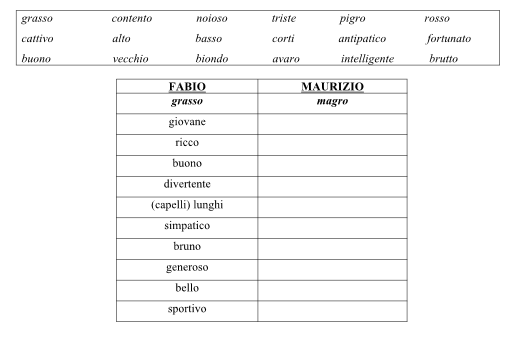Complete the sentence using the Spanish equivalent of the words in parentheses.
¿Los refrescos son para ________________ (me) o para ________________ (you), Paquito?
mí / ti
You might also like to view...
On your first day at your new Italian university, your host brother introduced you to his two best friends – who are complete opposites of each other. The vocabulary words on the left describe Fabio, while the words found in the word-bank describe Maurizio. Complete the chart by supplying the opposite descriptions of Fabio. You will not use all of the words.

A conjunction that begins with an adverb clause and shows that the ideas in the clause are dependent on those in the main clause is called
A) a coordinating conjunction. B) a subordinating conjunction. C) a participial clause.
Transformez les phrases en remplaçant le complément d’objet direct en gras (bold) par un pronom.
1.Quelqu’un a volé ma clé. ________________________________________________________________ 2. Prenez la photo de la Tour Eiffel pour votre cousine! ________________________________________________________________ 3. Vous connaissez les confitures aux bleuets? ________________________________________________________________ 4. J’adore l’odeur de la lavande. ________________________________________________________________ 5. Moi, je trouve les piments rouges trop piquants. ________________________________________________________________ 6. Je n’ai jamais commandé les escargots. ________________________________________________________________
"Divers," Eighner argues, move through a "predictable series of stages" in learning
to scavenge, including a. disgust and self-loathing b. a compulsion to acquire everything they touch c. a realization that they must restrict themselves to those things immediately useful d. satisfaction at having found something useful e. all of the above